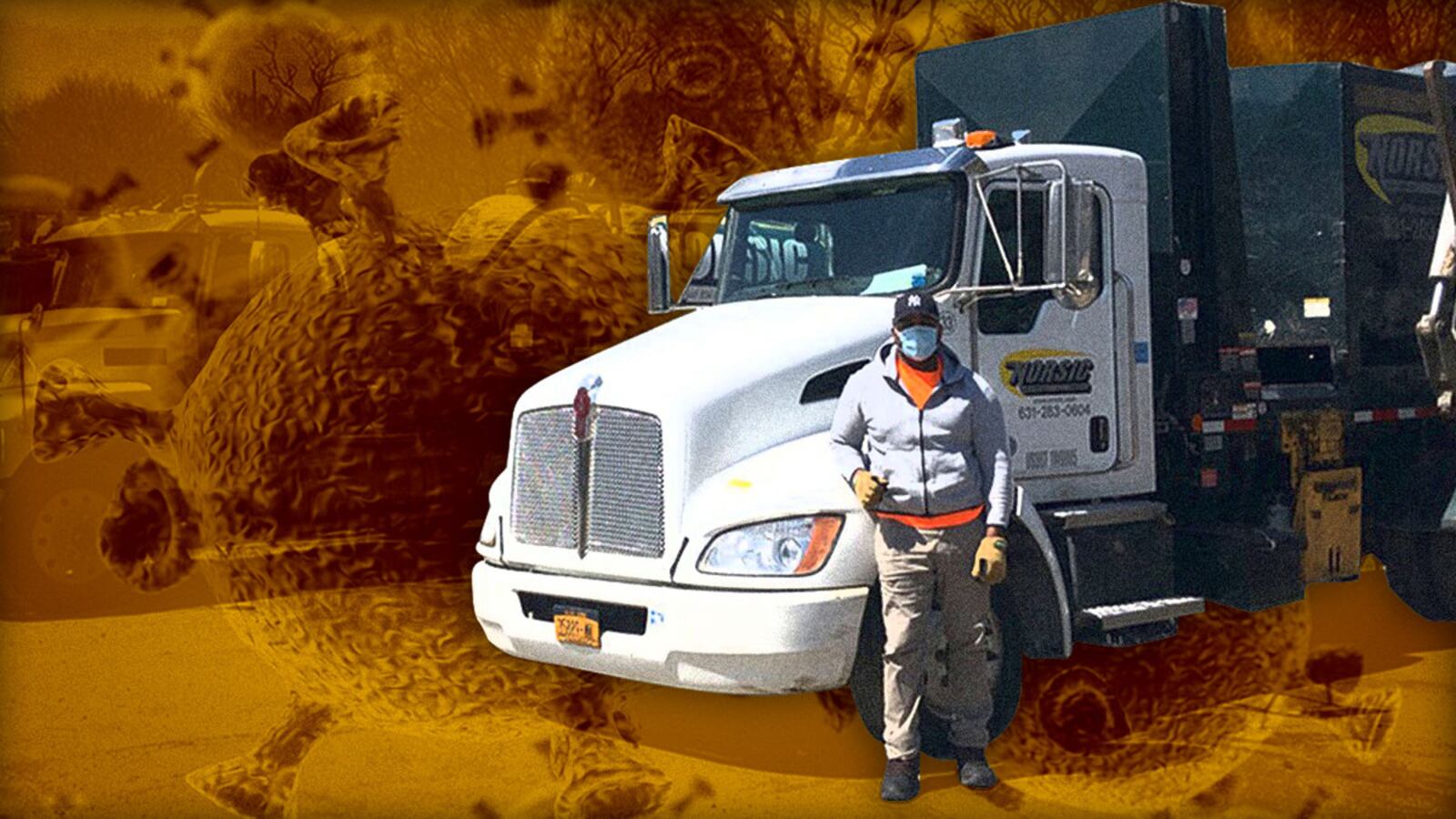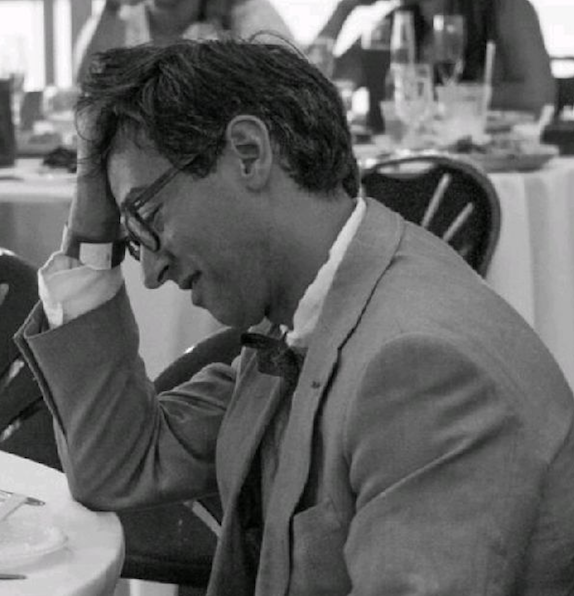For Javon Harding, the absurd amount of cardboard was the first sign of trouble.
A 43-year-old who does sanitation work in Southampton, on eastern Long Island, Harding had caught wind of wealthy Manhattanites fleeing the national COVID-19 epicenter that is New York City for an escape to the tranquil Hamptons. But he wasn’t prepared for the sheer volume of waste on his routes this spring.
“The amount of cardboard is ridiculous. That was the most shocking thing. Just piles of cardboard,” Harding told The Daily Beast.
Likewise, his boss, Emil Norsic Jr., described with some amusement the scale of the garbage left on the curbs outside posh estates where wealthy people have been hunkering down for the long haul.
“At this one stop there were three or four freezers delivered and they came in wooden crates, so we had to remove the wood, and there was a lot of debris,” Norsic said. “That’s happening more and more.”
Interviews with Hamptons sanitation workers painted a picture of aggressive panic-buying upending their jobs. To some extent, it was just the summer season arriving early as the rich took flight from packed city neighborhoods full of COVID-19 patients to a playground where they have long consumed conspicuously.
But there was also the creeping sense all that shopping was putting sanitation workers at undue risk during a pandemic.
“You can tell people are buying new furniture,” said Will Flower, supervisor of Winters Brothers Waste Systems in Quogue, ticking off old patio umbrellas, wicker furniture, and golf clubs as among the items he and his co-workers were hauling away.
“Families are throwing out old kids toys and other items that they want to replace so they have something to do while they’re quarantined,” Harding said. He and Norsic mentioned fans, an oven, mattresses, charcoal and electric grills, couches, and boats as among the detritus they’d hauled off.
Drivers have, of course, found masses of boxes emblazoned with Amazon’s curved arrow insignia—one way the not-so-rich and rich are both avoiding brick-and-mortar stores nationwide. But the stakes for garbage workers handling all that material aren’t exactly low when early research has pointed to the potential for COVID-19 to linger for up to a day on cardboard surfaces.
"As soon as I get off to work, I go to my garage, strip down to my boxers, I go to the bathroom, and take a shower,” Harding told The Daily Beast, adding, “There’s a lot more cleaning just to stay safe.”
The East End has long been a beacon for wealthy New Yorkers seeking refuge in between Memorial Day and Labor Day. There are roughly 100,000 residents who live year-round in the villages between Montauk and Eastport that comprise the Hamptons, and some estimates put the posh region’s peak summer population at 262,000 a decade ago. Locals say the population triples at that time of year.
It has only grown in recent years as a playground for the scions of industry, celebrities, and media elites who are a regular presence at summer soirees, lavish house parties, and high-dollar fundraisers for politicians helicoptering in for a lucrative weekend.
So it was no surprise that any Manhattanite with the means to flee the city for their second home on the South and North Forks packed their car in March as COVID-19 cases climbed. Year-round residents feared their citified neighbors brought the coronavirus with them and fretted when their grocery stories were picked clean of vegetables, meat, and gourmet cheese. East End town supervisors demanded the state impose travel restrictions and mandatory quarantines as seasonal residents socialized in town centers and held bonfires on beaches.
It hasn’t helped matters that celebrities like George Stephanopoulos and Chris Cuomo have been spotted in East Hampton and accused of leaving quarantine, nor that Hollywood bigs like Sarah Jessica Parker have been running errands (apparently) without face masks.
“People are still not observing social distancing. There’s a lot of people who think they’re outside and in the open air, and we need to convey to them to follow those policies,” said Southampton Public Safety & Emergency Management Administrator Ryan Murphy. “This doesn’t just apply to strangers—this should be with friends and even, when possible, family members.”
So far the East End has been fortunate to avoid a truly massive outbreak. There were 28,168 cases in Suffolk County as of Monday evening, including 442 in Southampton, 265 in Southold, and 121 in East Hampton. And Stony Brook Southampton Hospital had, as of earlier this month, been able to treat COVID-19 patients without needing additional capacity.
But weekend trippers show no sign of leaving anytime soon.
Some are even deigning to dispose of their garbage themselves, taking recyclables and food waste to municipal transfer stations. About 15 percent of Southampton households use these facilities, but town officials noticed there had been an 18 percent increase in cardboard, a 15 percent increase in trash, and a 68 percent increase in metal last month compared with March 2019.
Southampton Waste Management Division Head Ed Thompson spends much of his day directing newcomers where to dispose of their rubbish.
“I can tell when people haven’t been here before—they don’t understand what goes where,” Thompson told The Daily Beast. “They unload their vehicles themselves and say, ‘Hey, I threw a mattress in the metal pile.’ Obviously, mattresses don’t go with the metal.”
The rest of the residents hire private carters like Norsic & Son. That has meant six-day weeks and 10 hours days for some sanitation workers.
Harding gets up at 4 a.m. at his home in Wading River on Long Island's north shore six days a week to get to the yard by 6 a.m. He and other drivers pick up waste from about 125 homes a day in Southampton and East Hampton until 3:30 or 4 p.m.
He’s happy to have a job during a pandemic-triggered recession, and has family members who are waiting for unemployment checks that have not arrived.
"They did get the stimulus check yesterday, but other than that they are really hurting, and I’m trying to help out as much as I can,” he said last week. “I go shopping, ask if they need anything.”
The shutdown impacts middle-class people like him at home, too, of course.
“We used to go to the movies every other weekend but now the kids are cooped up in the house with no school,” Harding said, speaking of his kids aged 10, 12, and 14.
Most of all, though, Harding worried about potential exposure.
“Knowing that the virus itself can stay on certain objects for a day or two days—that’s the scary part of it,” he said.







